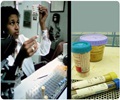
According to professor Antonio Gasbarrini from the Gemelli University Hospital in Rome, Italy, an oral formulation that simplifies fecal microbiota transplantation (FMT) is a major step forward.
"FMT is an excellent treatment for C. difficile infection, but traditional methods are time-consuming and technically challenging," he said. "Advances in the preparation and delivery of FMT will lead to its wider acceptance as a safe and effective treatment for C. difficile infection that could supersede antibiotics," Gasbarrini noted.
The consequences of recurrences of C. difficile infection can be severe, resulting in life-threatening illness and frequent hospitalizations. FMT from a healthy donor to an individual with C. difficile infection can restore the healthy gut microbiota and resolve symptoms.
FMT has traditionally been performed using a liquid suspension of feces from a related donor, which is transplanted into the body using a nasogastric tube, endoscopy, enema or colonoscopy. A recent systematic review of the literature concluded that FMT was both effective and safe for the treatment of recurrent C. difficile infection.
"We believe that FMT is an excellent therapeutic option for patients who have failed to respond to antibiotic treatments or who have severe or multiple recurrences," Gasbarrini pointed out.
Advertisement
Source-IANS














